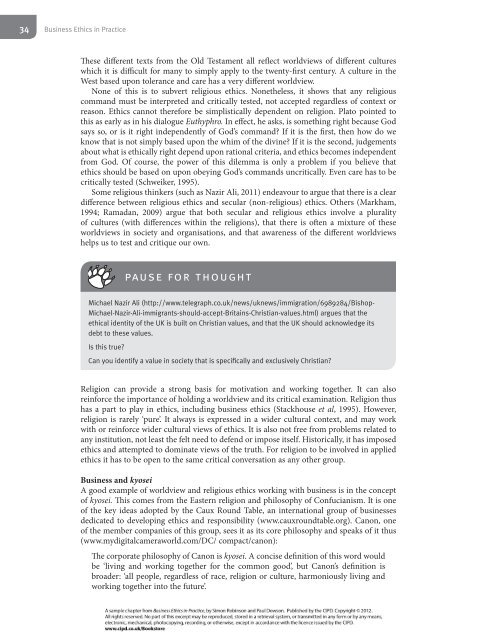normative Ethical theory - CIPD
normative Ethical theory - CIPD
normative Ethical theory - CIPD
Create successful ePaper yourself
Turn your PDF publications into a flip-book with our unique Google optimized e-Paper software.
34Business Ethics in PracticeThese different texts from the Old Testament all reflect worldviews of different cultureswhich it is difficult for many to simply apply to the twenty-first century. A culture in theWest based upon tolerance and care has a very different worldview.None of this is to subvert religious ethics. Nonetheless, it shows that any religiouscommand must be interpreted and critically tested, not accepted regardless of context orreason. Ethics cannot therefore be simplistically dependent on religion. Plato pointed tothis as early as in his dialogue Euthyphro. In effect, he asks, is something right because Godsays so, or is it right independently of God’s command? If it is the first, then how do weknow that is not simply based upon the whim of the divine? If it is the second, judgementsabout what is ethically right depend upon rational criteria, and ethics becomes independentfrom God. Of course, the power of this dilemma is only a problem if you believe thatethics should be based on upon obeying God’s commands uncritically. Even care has to becritically tested (Schweiker, 1995).Some religious thinkers (such as Nazir Ali, 2011) endeavour to argue that there is a cleardifference between religious ethics and secular (non-religious) ethics. Others (Markham,1994; Ramadan, 2009) argue that both secular and religious ethics involve a pluralityof cultures (with differences within the religions), that there is often a mixture of theseworldviews in society and organisations, and that awareness of the different worldviewshelps us to test and critique our own.pause for thoughtMichael Nazir Ali (http://www.telegraph.co.uk/news/uknews/immigration/6989284/Bishop-Michael-Nazir-Ali-immigrants-should-accept-Britains-Christian-values.html) argues that theethical identity of the UK is built on Christian values, and that the UK should acknowledge itsdebt to these values.Is this true?Can you identify a value in society that is specifically and exclusively Christian?Religion can provide a strong basis for motivation and working together. It can alsoreinforce the importance of holding a worldview and its critical examination. Religion thushas a part to play in ethics, including business ethics (Stackhouse et al, 1995). However,religion is rarely ‘pure’. It always is expressed in a wider cultural context, and may workwith or reinforce wider cultural views of ethics. It is also not free from problems related toany institution, not least the felt need to defend or impose itself. Historically, it has imposedethics and attempted to dominate views of the truth. For religion to be involved in appliedethics it has to be open to the same critical conversation as any other group.Business and kyoseiA good example of worldview and religious ethics working with business is in the conceptof kyosei. This comes from the Eastern religion and philosophy of Confucianism. It is oneof the key ideas adopted by the Caux Round Table, an international group of businessesdedicated to developing ethics and responsibility (www.cauxroundtable.org). Canon, oneof the member companies of this group, sees it as its core philosophy and speaks of it thus(www.mydigitalcameraworld.com/DC/ compact/canon):The corporate philosophy of Canon is kyosei. A concise definition of this word wouldbe ‘living and working together for the common good’, but Canon’s definition isbroader: ‘all people, regardless of race, religion or culture, harmoniously living andworking together into the future’.

















